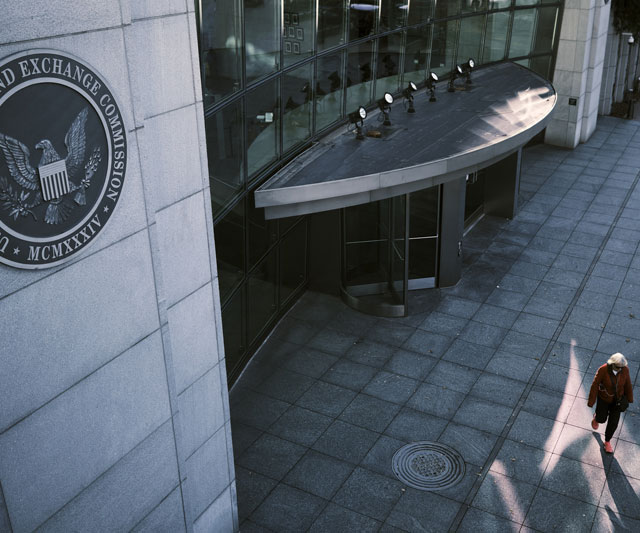The Supreme Court’s conservative majority seemed receptive on Wednesday, Nov. 29, to an attack on one of the primary ways the Securities and Exchange Commission enforces laws against securities fraud.
The agency, like other regulators, brings some enforcement actions in internal tribunals rather than in federal courts. The practice has been criticized, mostly by conservatives, on a variety of grounds, including that it violates the constitutional right to a jury trial, the separation of powers and basic fairness.
“The government can deprive you of your property, your money, substantial sums,” Justice Brett Kavanaugh said during arguments Wednesday, “in a tribunal that is at least perceived as not being impartial in the sense that it’s an in-house executive agency where the commissioners start the enforcement process, oversee the enforcers and then appoint the adjudicators and review the adjudication. That doesn’t seem like a neutral process.”
The case, Securities and Exchange Commission v. Jarkesy, is one of several challenges this term to the power of administrative agencies, long a target of the conservative legal movement. The court heard arguments in October over the constitutionality of the way the Consumer Financial Protection Bureau is funded. In January, it will consider overruling the Chevron doctrine, a foundational principle of administrative law that requires judicial deference to agencies’ reasonable interpretations of statutes.
The argument Wednesday mostly focused on a key difference between proceedings in administrative tribunals and ones in federal courts: Only the latter guarantee defendants a constitutional right to a jury.
Justice Neil Gorsuch said the difference was crucial. “The right to trial by jury, whether it’s criminal or civil,” he said, “is a very important foundational freedom in American society and a check on all branches of government.”
Brian H. Fletcher, a lawyer for the agency, said the two proceedings serve different purposes with different rules. In administrative tribunals, he said, the government was protecting the rights of the public generally. “We’re trying to vindicate the public’s right to fair and honest markets,” he said.
When the public’s rights are at issue, he said, the right to a jury trial guaranteed by the Seventh Amendment in “suits at common law” did not apply.
Justice Amy Coney Barrett said the court had not succeeded in drawing an administrable line in this area. “Our cases have not been very clear about how to distinguish public from private rights,” she said.
But Kavanaugh said the right to a jury was all the more vital in cases brought by the government.
“What sense does it make to say the full constitutional protections apply when a private party is suing you,” he asked, “but we’re going to discard those core constitutional historic protections when the government comes at you for the same money?”
The case concerns George Jarkesy, a hedge fund manager accused of misleading investors. The SEC brought a civil enforcement proceeding against him before an administrative law judge employed by the agency, who ruled against Jarkesy. After an internal appeal, the agency eventually ordered him and his company to pay a civil penalty of $300,000 and to disgorge $685,000 in what it said were illicit gains.
Jarkesy appealed to the 5th U.S. Circuit Court of Appeals in New Orleans. A divided three-judge panel of that court ruled against the agency on three different grounds, all with the potential to disrupt enforcement of not only the securities laws but also many other kinds of regulations.
Wednesday’s argument, which lasted about 2 1/2 hours, was almost entirely centered on that first ground, about the right to a jury trial. It touched only glancingly on the appeals court’s ruling that the agency’s judges were excessively insulated from presidential oversight and not at all on its third holding, that Congress could not allow the agency itself to decide where suits should be filed.
S. Michael McColloch, a lawyer for Jarkesy, said “the jury trial right should apply especially when the government is coming after a citizen for penalties.”
Agency adjudications without juries are commonplace, Fletcher said, adding that there are “two dozen agencies that have the authority to impose penalties in administrative proceedings.”
Several justices seemed wary about a ruling that would sweep too broadly and affect actions by, say, the Federal Trade Commission, the Internal Revenue Service, the Environmental Protection Agency, the Social Security Administration, the National Labor Relations Board or the Occupational Safety and Health Administration.
A broad ruling for Jarkesy, Justice Sonia Sotomayor said, could be “quite dramatic.”
The justices spent much of the argument grappling with a 1977 Supreme Court decision that some of them said squarely supported the government’s position.
Chief Justice John Roberts said government agencies have much more power these days, suggesting that the precedent warranted reexamination. “The extent of impact of government agencies on daily life today is enormously more significant than it was 50 years ago,” he said.
Justice Elena Kagan countered that the 1977 decision required a ruling for the agency, adding that it had not been challenged in the intervening decades. “Nobody has had the, you know, chutzpah,” she said, “to quote my people.”
c.2023 The New York Times Company. This article originally appeared in The New York Times.







